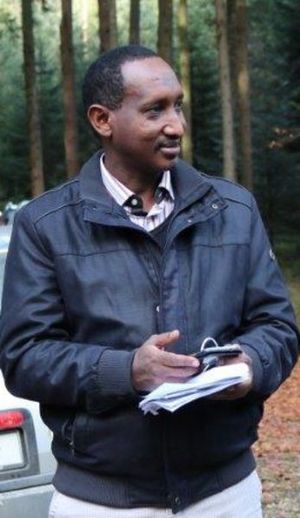- Akos Ivanyi, Ungarn
- Starford Mvula, Zambia
- Behruz Ilnazarov, Tadjikistan
- Lela Kakhniashvili, Georgia
- Carla Ocano, Uruguay
- Alfredo Rodriguez Zunino, Peru
- Rina Kristanti und Yayuk Siswiyanti, Indonesien
- Tibor Kadar, Rumänien
- Noor Hussein, Kenia
- Joaquin Garrido, Uruguay
- Lee Xiong, Laos
- Nehemia Gurusinga, Indonesien
- Edi Kurniadi und Kusdamayanti, Indonesien
- Myroslav Kabal, Ukraine
- Ekatherina Nevmerzhitskaya und Nikolay Nevmerzhitsky, Russland
- Le Xuan Toan, Vietnam
- Li Ming, China
- Ekaterine Balarjishvili, Georgien
- Gamin Gesa und Yopie Parisi, Indonesien
Experiences and lessons from the Forest Expert Traineeship Program in Germany - the Kenyan context

by Noor Maalim Hussein, Kenia
I was privileged to attend the Forest Expert Traineeship Programme from 5th to 30th November 2017 in my capacity as the Head of Farm Forestry and Project Manager Sustainable Private Forest Management (SPFM) Project in Kenya Forest Service (KFS) as well as the National Vice Chairman Forestry Society of Kenya (FSK).
Whereas KFS is a national agency with a similar mandate and organizational structures as that of Hessen Forst in Germany, SPFM Project is a bilateral partnership between the Governments of the Federal Republic of Germany and the Republic of Kenya. The project is jointly funded by BMEL and the Government of Kenya to support sustainable management of small and medium holders of private forests for improved incomes and livelihoods. The Forestry Society of Kenya, has a similar mandate of advancing the practice professional forestry and the interest of its members to that of the German Forest Society. This underscores the significance and relevance of the Forest Expert Course to the Kenya’s forest sector.
During the course period I conducted over 23 programme activities in the federal states of Lower Saxony, Bavaria, Hesse and Berlin. The activities were well customised to my desire and expectations. Thanks to the dedication and commitment of Sabine Kühling, Coordinator Forest Expert Program, and Marcus Kühling, Managing Director of the German Forest Society.
The course has been instrumental in providing useful experiences and lessons to Kenya’s forest sector. Whereas both Kenya and Germany have similar decentralized forest management structures, the clear and complimentary role differentiations between the 16 souvereign States and the National Federal Government of Germany, has been a useful guide in the implementation of the recently devolved forestry functions between the Kenya’s National Government and its 47 County Governments. Also adopted were incentives and the subsidy scheme as experienced in Germany. The provision of the monitory and non-monitory incentives and subsidies in the draft 2018 Private Forests Rules is expected to provide impetus to the development of private commercial forests in Kenya.
The course experience was also instrumental in the implementation of a partnership arrangement between the German Private Forest Owners organizations (AGDW) and the Tree Growers Associations of Kenya. Although it was on a short term basis the partnership has improved the governance structure of the Tree Growers Associations in Kenya.
(…)
Key experiences and lessons implemented in Kenya
After the stay in Germany the experiences and lessons were shared with different stakeholders in various forums. They include the senior management of Kenya Forest Services, the Forestry Society of Kenya; and the Associations of Tree Growers in Kenya. The following are some of the key experiences and lessons that elicited elevated interests among the stakeholders:
1. The concept of multi-functional “Close to nature” forest management principle widely practiced in the German Forest sector, is also relevant and useful to the Kenya’s context. The concept is particularly important for enhancing the ecological, economical and social functions of the Kenya’s natural forests, which is traditionally managed for non-extractive ecological benefits only. The concept is also significant in mitigating the increasing adverse effects of climate change, to its ability to establish and perpetuate a structurally diverse forest.
2. Elaborate incentives and subsidy schemes jointly funded by the Federal and the States Governments of Germany to promote private / community forest development, is an important lesson and a yardstick for the Kenya’s forest sector. Provision of monitory and non monitory incentives and subsidies in the Draft 2018 Private Forest Rules and Regulations are expected to provide an impetus to the development and growth of commercial private forests in Kenya.
3. Clear and complimentary roles between the German Federal Government and the 16 States Governments in management of forests and forest resources are an important guide to the implementation of the recently devolved forestry functions in Kenya.
4. The functionality of the forest administration structures in the states of Bavaria, Lower Saxony, and Hesse, is an important benchmark for the Kenya’s recently constituted 46 County Governments.
5. The historical growth trajectory of the German’s Private Forests and Private Forest Associations, presents a great sense of optimism for the growth and development of the Kenya’s infant Private forests and Private Tree Growers Associations. The persistency and resilience of German Forest Association & cooperatives in addressing some of the basic governance issues provide important lessons for its Kenyan Tree Growers Association.
6. Consolidation and management of fragmented smallholders’ forests into a single management unit under an organized structure provides a better economical, ecological and social benefits.
7. Strong private forest owners /producers associations are a sure way of overcoming the continuing parcelling of lands into smaller units by successive inheriting generations, impeding the development of private forests in Kenya.
8. Clear and tangible benefits, is the foundation for loyalty, trusts, and strong membership base for all private forest owners/ producer associations in Germany. This is a useful example for the young private forest producers associations in Kenya.
9. Adoption of forest education policy particularly on forest pedagogy (children education) as developed and implemented in Germany, will be a fascinating way of inculcating the “conservation culture” into the Kenyan citizenry.
10. The Forest Expert Program is relevant to the Kenya’s forest sector. Its flexibility and tailor made courses will significantly benefit all forestry institutions in Kenya; KFS, County Governments, Forest owners /producer organizations, Training institutions, and civil society organizations

